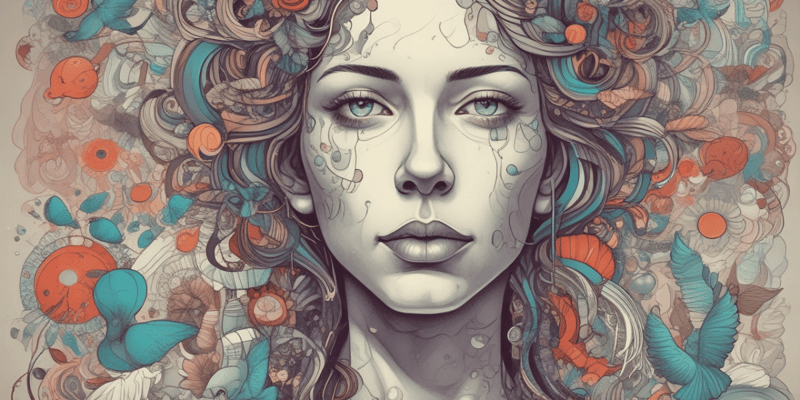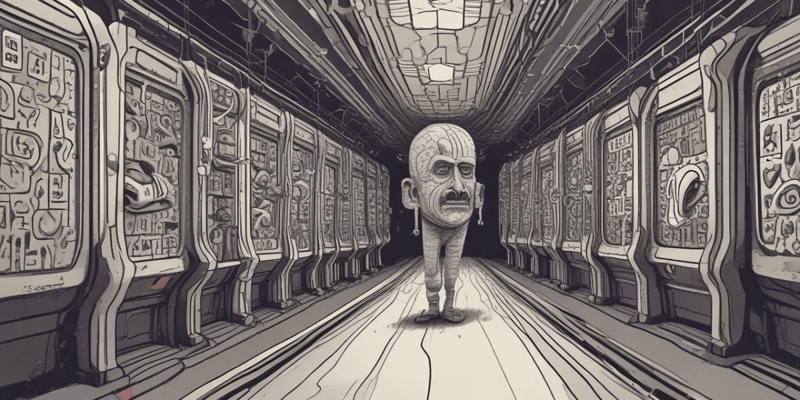36 Questions
What is accelerated thinking characterized by?
Fast formation of new associations and fast reproduction of old associations
Which of the following symptoms is typical of a manic episode?
Unusual talkativeness and reduced need for sleep
What is perseveration?
Multiple senseless repetitions of the same words or sentences
What is anhedonia?
Reduced capacity to experience pleasure
What is slowed thinking characterized by?
Painful, poor, monotonous thinking
What is the minimal duration of symptoms required to make the diagnosis of schizophrenia?
6 months
Which of the following statements is incorrect?
Dysthymia is emotional inappropriateness
What is the positive symptom of schizophrenia that includes delusions and hallucinations?
Delusions, hallucinations
What is the term for the reduction of pleasure in usual activities in depression?
Anhedonia
Which of the following is a contraindicated strategy in bipolar depression?
Monotherapy with antidepressants
What is the most common problem in dementia?
Memory deficit
What is the term for a syndrome caused by a diffuse organic brain disease with a chronic and progressive nature?
Dementia
What is the term for the simultaneous emergence of conflicting thoughts?
Ambivalent thinking
What is the term for loss of sensory or voluntary motor function without objective findings on physical examination?
Conversion disorder
What is the term for pathologically elevated asthenic emotions?
Hypothymia
What is the term for the delusions of guilt?
Depressive delusions
What is the term for a group of symptoms including stupor, catalepsy, waxy flexibility, mutism, negativism, and posturing?
Catatonia
What is the term for quantitative disturbances of memory?
Amnesia, hypomnesia, hypermnesia
What is characterized by severely disrupted logical connections between words, tendency to use pompous language, simultaneous emergence of conflicting thoughts, and multiple repetition of unnecessary details?
Incoherent thinking
What is the therapeutic effect of antipsychotic medications attributed to?
D2 receptor blockade in the mesolimbic pathway
What is the minimal duration required to make a diagnosis of schizophrenia?
6 months
What is depersonalization characterized by?
Disturbance of perception
What is pathologically increased asthenic emotions referred to as?
Hypothymia
What is defined as 'pathologically increased volitional activity'?
Hyperbulia
What does conversion disorder usually include?
Seizures, loss of consciousness, loss of skin sensitivity without any objective findings on examination
What does the reversion law of Ribot state?
The earliest to lose and the latest to recover are the oldest memories
What are the characteristic symptoms of Korsakoff's syndrome?
Disorientation, confabulation, anterograde amnesia
What are the negative symptoms of schizophrenia?
Abulia, alogia
What is a side effect of benzodiazepine administration?
Anterograde amnesia
What are delusional ideas?
An incorrect mental reflection of reality
What are the characteristic symptoms of a manic episode?
Unusual talkativeness and decreased need for sleep
What is the most frequently studied type of psychotherapy?
Cognitive behavioral therapy
What is the most common type of dementia?
Alzheimer's dementia
What is confabulation?
‘invented‘ memories used by the patient to fill in the ‘gaps’
What are obsessions?
Repetitive thoughts
What is a characteristic of disorganized thinking?
Severely disrupted logical connection between the words
Study Notes
Incoherent Thinking and Schizophrenia
- Incoherent thinking is characterized by severely disrupted logical connections between words, tendency to use pompous, pseudo-philosophical, pseudo-scientific language, simultaneous emergence of conflicting thoughts, and multiple repetitions and abundance of unnecessary details.
- The therapeutic effect of antipsychotics is due to D2 receptor blockade in the mesolimbic pathway.
Schizophrenia Diagnosis and Symptoms
- The minimal duration of the prodromal symptoms, the psychotic episode, and the residual symptoms required to make the diagnosis of schizophrenia is 6 months.
- Positive symptoms of schizophrenia include delusions, hallucinations, disorganized speech, and disorganized behavior.
- Negative symptoms of schizophrenia include abulia, alogia, affective flattening, avolition, anhedonia, and asociality.
Personality Disorders
- Personality disorders are chronic, affect the emotions, and do not affect the intellectual capacity of the individual.
- They are managed mainly with psychotherapy.
Eating Disorders
- The management of eating disorders includes biological treatment, psychotherapy, and sociotherapy.
- Anorexia nervosa includes restriction of food intake and may also include binge eating and purging behavior.
Dementia
- The most common problem in dementia is memory deficit.
- The most frequently occurring type of dementia is Alzheimer's dementia.
- Dementia is a syndrome caused by a diffuse organic brain disease with a chronic and progressive nature, in which many of the higher cortical functions are damaged.
Psychotherapy
- The effectiveness of cognitive-behavioral therapy is the most intensively studied.
Suicide Risk Assessment
- The internal state of the individual is more important than the external circumstances in suicide risk assessment.
- Asking about suicidal thoughts and plans does not precipitate suicide attempts.
Other
- Conversion disorder typically presents with loss of skin sensitivity and/or voluntary motor function without objective findings on examination.
- Delusional ideas are an incorrect mental reflection of reality.
- Confabulations are "invented" memories used by the patient to fill in the gaps.
- Anhedonia is a reduced capacity to experience pleasure.
- Paraphilias are disorders of sexual arousal, and may include sexual fantasies and/or behaviors involving non-human objects, the suffering or humiliation of oneself or one's partner, or children or other non-consenting persons.
- Hyperthymia is a pathologically elevated asthenic emotion, and hypertrophy is a pathologically increased volitional activity.
Test your knowledge of psychology with this quiz on thought disorders, antipsychotic medications, and their effects on the brain.
Make Your Own Quizzes and Flashcards
Convert your notes into interactive study material.
Get started for free



